Year 2 (Grade 1) Signature Work Inquiry @ Blanchelande College
Home › Forums › Inquiry and resource design › Year 2 (Grade 1) Signature Work Inquiry @ Blanchelande College
Tagged: KS1, Primary, Signature Work, Year 2
- This topic has 2 replies, 1 voice, and was last updated 8 months, 1 week ago by
 Darryl Toerien.
Darryl Toerien.
-
AuthorPosts
-
22nd April 2024 at 3:13 pm #83114
When starting at Blanchelande College as Head of Inquiry-Based Learning in September of 2021, my priority was to establish an interdisciplinary Signature Work inquiry in the transition years from Infants (Year 2/ Grade 1) to Juniors, from Juniors (Year 6/ Grade 5) to Lower Seniors, from Lower Seniors (Year 9/ Grade 8) to Upper Seniors, and in the Sixth Form (Year 12/ Grade 11) rather than the last year of Upper Seniors (Year 11/ Grade 10), which is a public examination year. The reasons for this are:
- Signature Work – an inquiry-based exploration of a significant issue, problem or question that students help to identify and shape – is a distinguishing feature of a contemporary liberal education.
- A Signature Work inquiry in each of the transition years enables students to become increasingly familiar with the inquiry process while developing priority inquiry skills systematically and progressively within subject area teaching and learning (see below).
We have established Signature Work inquiries in Year 6 (2022) Year 9 (2022), and Year 12 (2022, although piloted in 2021). I am very excited to be collaborating on a Signature Work inquiry with our Year 2 Teacher, Nicky, which is centred on their annual visit to Herm Island, a 15-minute ferry journey away from Guernsey, and these are our early thoughts.
The fact that Year 2 visit Herm Island naturally raises the question of why people visit Herm, which is linked to the more interesting question of why people live there, and what life on Herm is like for them. As it turns out, Herm is currently in the news – Herm’s CEO leaving the island later this year and Herm tenant says island facing a tough summer – which makes the question even more authentic.
This provides us with a powerful inquiry question: Why do people live on Herm and what is life like for them?
With this in mind, are approaching the visit as a field trip, with a combined field journal as the product of the Express stage, which could be ‘published’ for an audience of Year 1, who will undertake next year’s Herm Island Field Trip and add to the emerging record, as well as Year 2 parents and families.
Framing the inquiry as a field trip lends itself perfectly to the process of Heroic Inquiry, which I have aligned with the Hero’s Journey and adapted for Primary (see below).
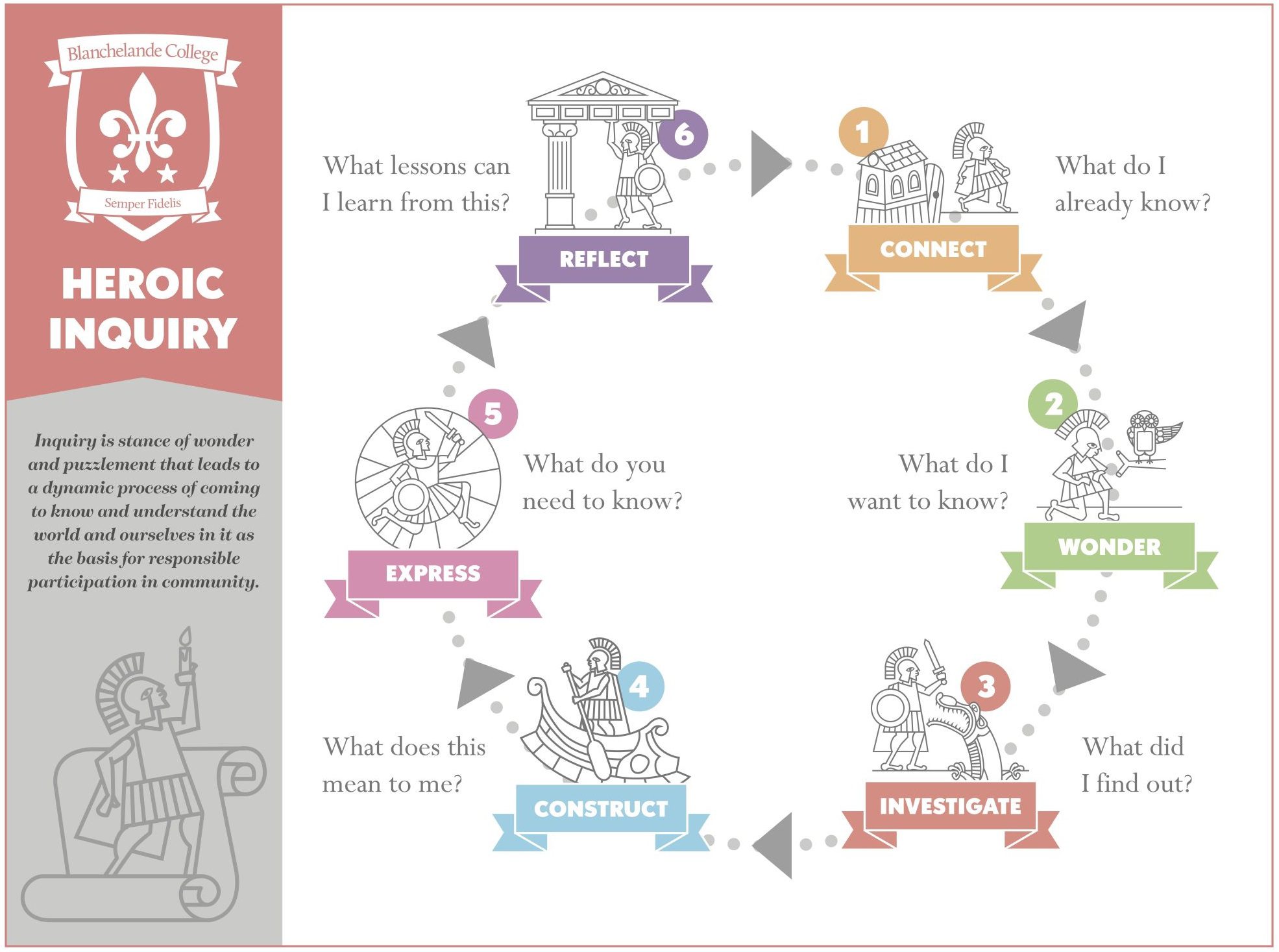
It is essential that pupils are meaningfully aware of this process/ journey if they are to internalise it.
Year 2 Herm Signature Work Inquiry: Why do people live on Herm and what is life like for them?
- Connect: What do pupils already know about Herm?
- Priority FOSIL skill: Shares what is known about the general topic to elicit and make connections to prior knowledge.
- This information can come from direct experience of students who have been to Herm, or indirect experience of others who have been to Herm or know about Herm, whether oral (e.g., their parents, or older students in the school from Herm) or documented (e.g., Herm Island website, and/ or records from previous trips, which could include photographs, pupil drawings and/ or writings and/ or recollections of Year 3).
- Pupils will need to be introduced to the idea of a field trip and a field journal – see this very creative and practical idea by Lynda R. Williams. It is essential for engagement that they see themselves as undertaking exciting and important fieldwork – adding to the College’s documentary record of life on Herm. Our challenge is to make this idea accessible to them, which is why Bruner’s encouragement is helpful: “Any subject can be taught effectively in some intellectually honest form to any child at any stage of development.”
- Wonder: What do pupils want to know about Herm?
- Priority FOSIL skill: Develops “I Wonder” questions with the class while reading or listening to texts about the research topic. This text could be information from the Herm Island website, for example, or newspaper articles.
- Reflecting on what we know raises questions, some of which will be more productive than others, which pupils will need help with identifying.
- The most productive questions will be those that relate to most closely to the inquiry question, for example:
- What is the population of Herm?
- Do people only live on Herm because of tourism?
- Have people lived on Herm before? For how long?
- Where on Herm do people live? Why?
- How self-sufficient is Herm?
- How dependent is Herm on tourism?
- What attracts tourists to Herm? History? Geography? Nature? Food?
- It is important to help students arrive at these questions with a sense of ownership, so that these questions become their questions. This investment in the questions shifts the focus from information gathered during Investigate, which is necessary, to what sense they make of the information in Construct, which the point of the inquiry – learning from information. This is also the key to developing academic integrity.
- These questions also guide the investigation, and hence the design of field journal.
- We will need to decide on the design and construction of the field journal. Given time constraints, a normal notebook might be the best option, although it might be possible to get ones that look more like journal and less like a notebook. Going forward, these could be made by the pupils, which would be an interesting and rewarding exercise (see Reflect below).
- The questions from Wonder will determine the sections of the field journal, which is why they require careful thought.
- Investigate: What did pupils find out about living on Herm?
- Priority FOSIL skill: There are four, but the one that most suits this inquiry is: Making Sense of Information and Notetaking | With help, finds facts and briefly summarizes them via writing, drawing, or verbalization to answer basic research questions.
- We will need to think about how to manage the investigation.
- The question from Wonder, and the resulting sections of the field journal, will determine where on Herm pupils visit and who they talk to.
- Will pupils work individually, or in pairs/ groups?
- How will pupils document their evidence – writing, drawing, photographing, recording (video and/ or audio) – and who will be responsible for/ required to do what?
- Construct: What did pupils learn about life on Herm from their field trip?
- Priority FOSIL skill: There are two, but the one that most suits this inquiry is: Participates in discussions to draw conclusions about a topic or story.
- This is the most important stage of the inquiry, which is when pupils need to make sense of what they have found out during the field trip/ investigation in order to answer the inquiry question.
- Pupils will need to make sense of their findings individually and collectively.
- Express: What does the audience need to know about living on Herm?
- Priority FOSIL skill: There are two, both of which are necessary: (1) Uses writing process, emergent writing, and drawing to develop expression of new understandings; (2) With help, makes a list of the source(s) used with title and author (which may be the Herm Island website, but would also include anybody that they talk to/ interview).
- Express would take two forms:
- A ‘published’ field journal, which could serve as the starting point/ field guide for next year’s Herm Island Inquiry/ Field Trip.
- A presentation to parents/ families, etc., of individual field journals and the ‘published’ 2024 combined Year 2 field journal.
- We will need to decide how pupils collaborate on combining their individual field journals into a ‘publishable’ field journal.
- Reflect: What lessons did pupils learn from the inquiry in terms of the process and the product(s)?
- Priority FOSIL skill: There are two, but the one that most suits this inquiry is: Identifies own strengths and sets a goal for improvement.
- This stage is crucial, because it is where pupils reflect on their learning and grow as engaged and empowered inquirers.
- Because students reflect on both the product(s) of their learning and the process, this is also a valuable opportunity to involve pupils in planning ahead for the next field trip, with a view to making it an even more worthwhile expedition, while may include improvements to the field journal.
I have now met with Nicky for the second time, and will be joining her on Thursday or Friday afternoon to relate the field trip to the Heroic Inquiry process. I am also looking forward to what they make of the field journals.
16th May 2024 at 1:49 pm #83403A lot has happened since I started this topic.
Firstly, the lesson to relate the field trip to the process of Heroic Inquiry (click on image to enlarge).

In preparing for this lesson, I came across the following map of Herm (click on image to enlarge), which provided us with a focus for our field trip/ heroic inquiry.
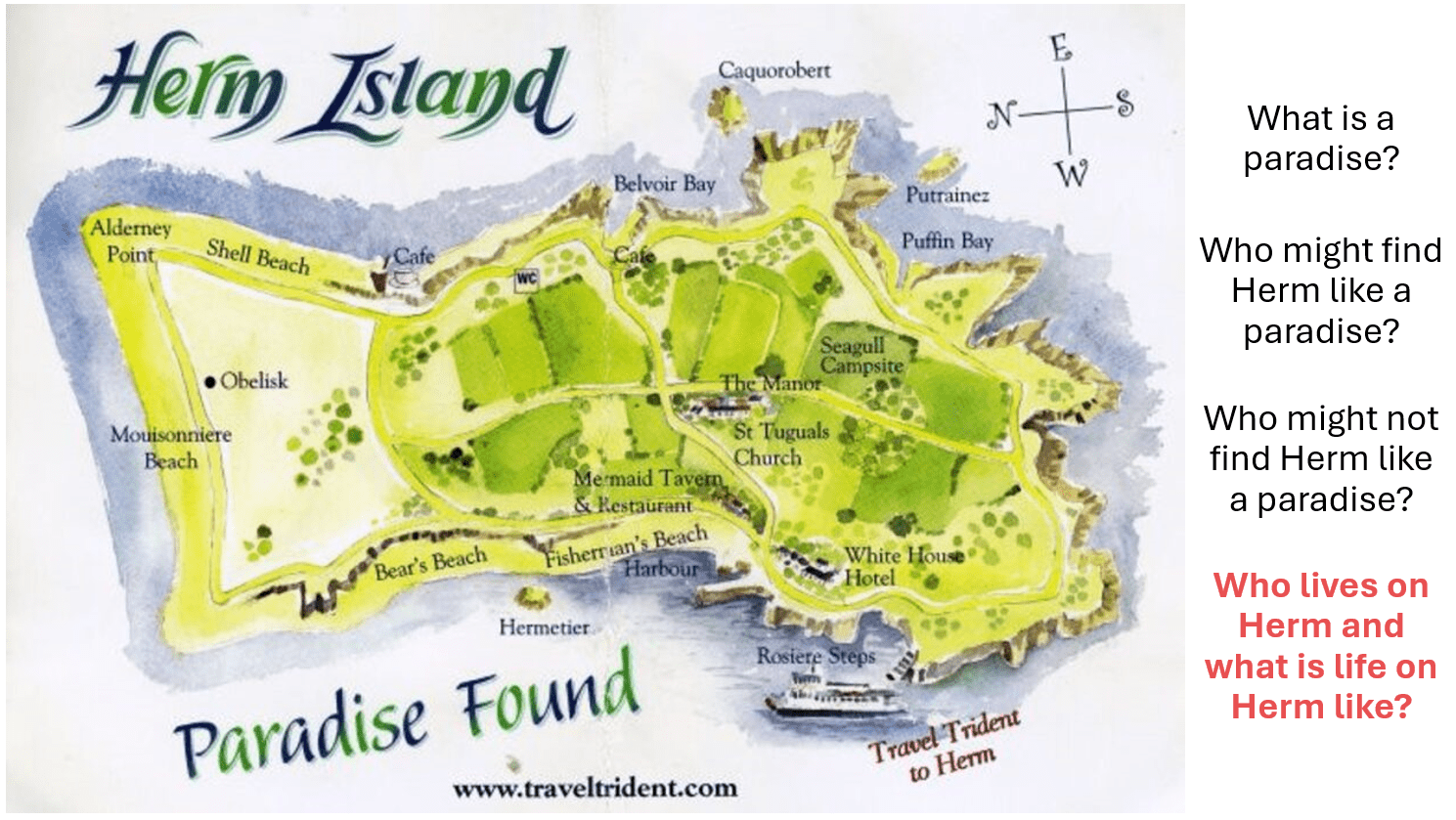
Secondly, the field trip itself, which coincided with ideal weather conditions (which proved significant to our inquiry). We developed the following questionnaire (click on image to enlarge), and we were able to interview a wide range of exceedingly friendly and helpful Herm Island staff (8) and visitors (8). I was deeply impressed by how inquisitive the pupils were and how keen they were to document their experiences on the field trip, in both writing and drawing – I will share samples of this later.
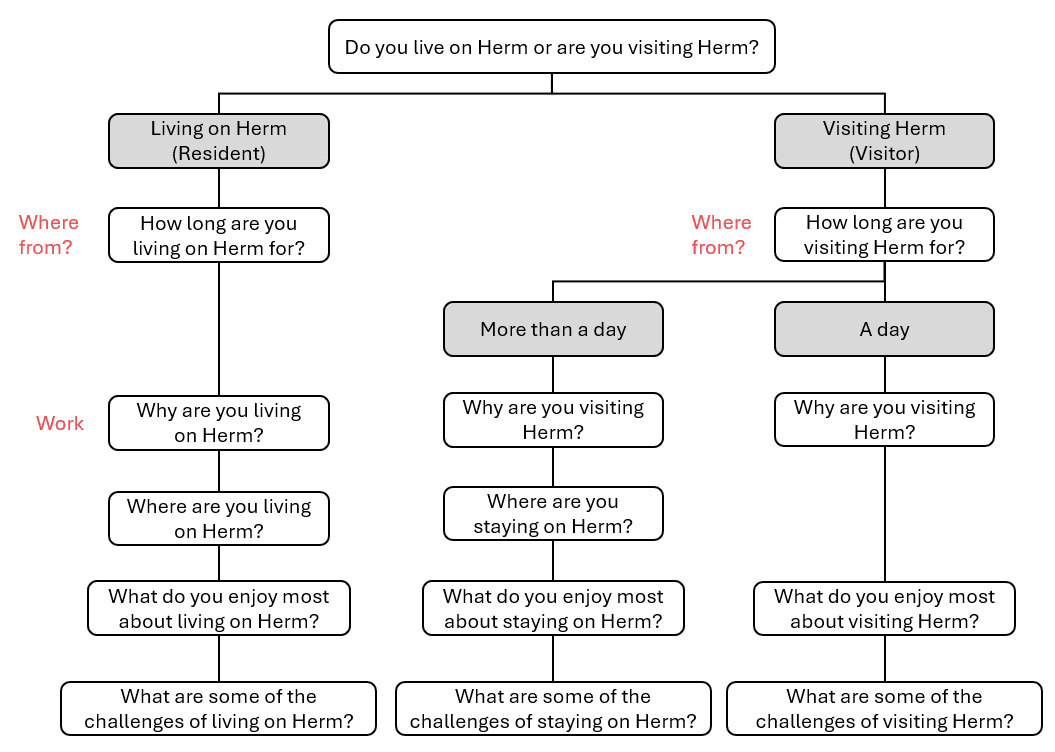
Thirdly, the lesson following the field trip. I created a chronological presentation of the field trip, which included a word cloud of responses to our questionnaire (click on image to enlarge) – note that I did not separate residents from visitors.
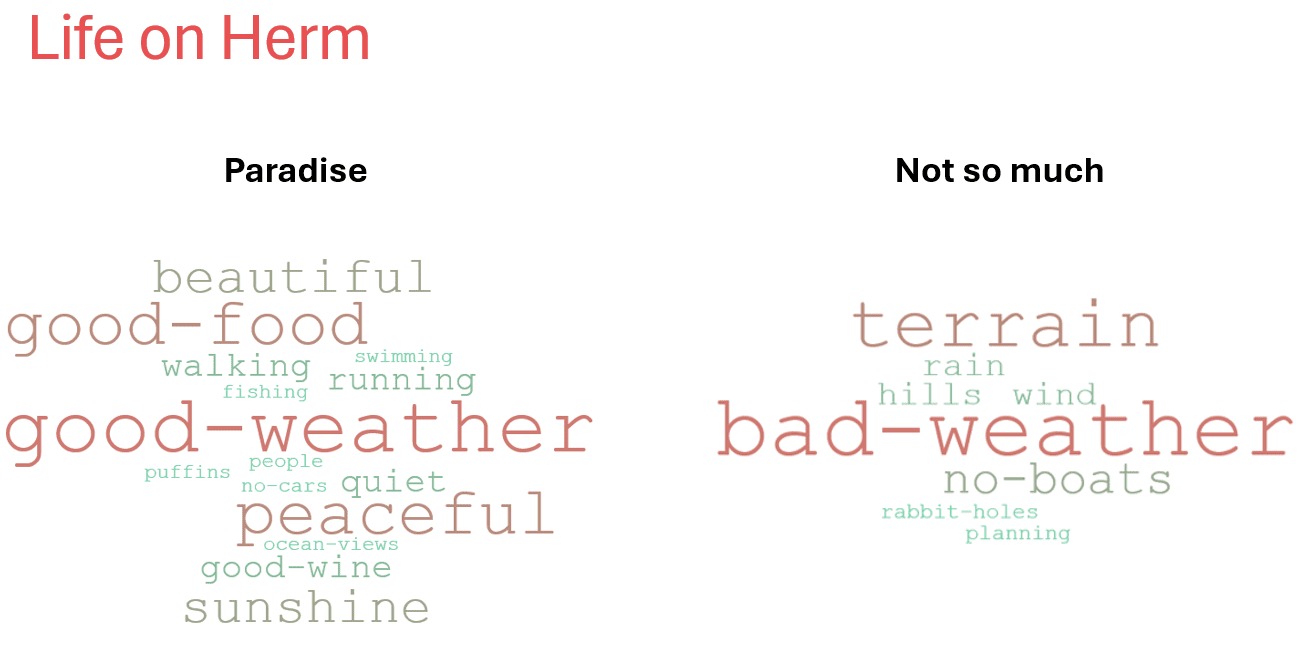
I was very pleased that we are able to use another map that found to calculate that we had walked about 2 miles during our field trip (click on image to enlarge).
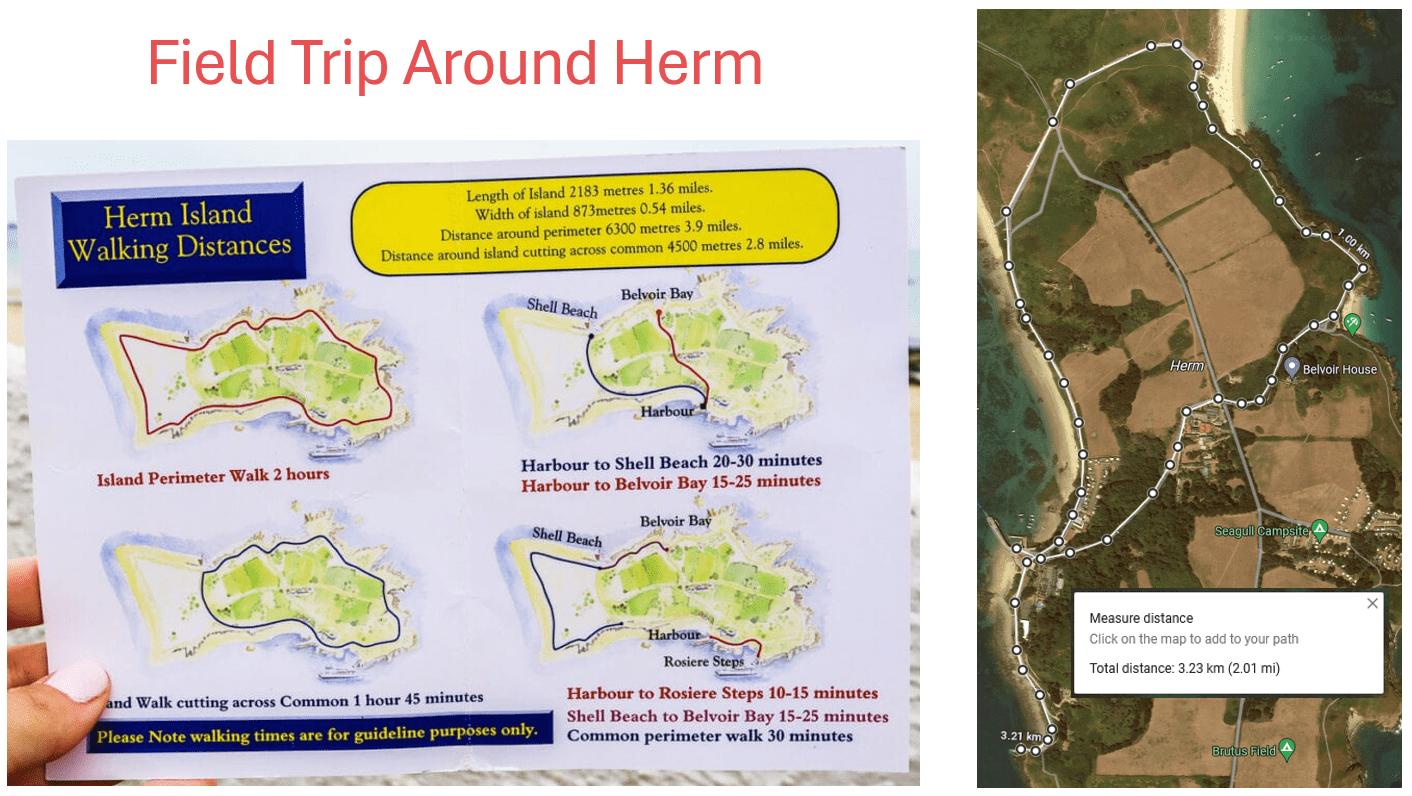
We are going to produce a field guide to Herm for the next cohort of heroic inquirers to use and develop further, and pupils will each capture a personal highlight of their field trip in a drawing accompanied by a written reflection (click on image to enlarge), which will help shape next year’s field trip.

I will update on progress towards the field guide in due course.
24th June 2025 at 11:42 am #86951On Wednesday, 18 June, we held our second annual Year 2 Signature Work Inquiry Celebration.
Herm is a very special place, made more so by the very special people who live and work there, and the purpose of the Year 2 Signature Work Inquiry is to build knowledge and understanding of what life on Herm is like, for both residents and visitors.
We were delighted to be joined by Shaun McDonald, General Manager of The White House Hotel, and Alison Veitch, Head Chef.

I realise now, to my shame, that I did not share highlights from last year’s Field Guide; however, I share highlights from this year’s Field Guide instead. The Field Guide is published by the Library and presented to staff and students who took part in the Field Trip, as well as the residents who we met.
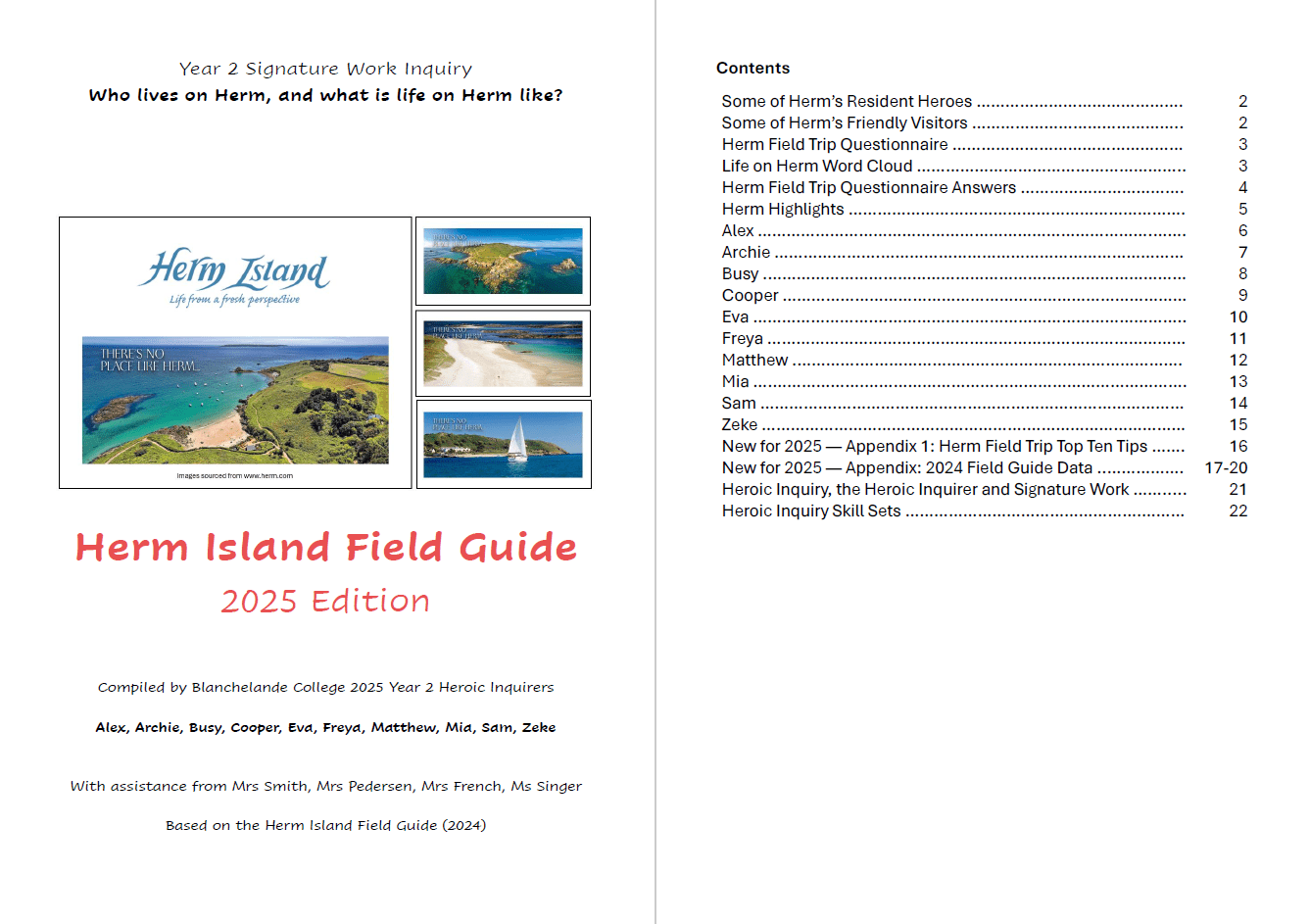





-
AuthorPosts
- You must be logged in to reply to this topic.


